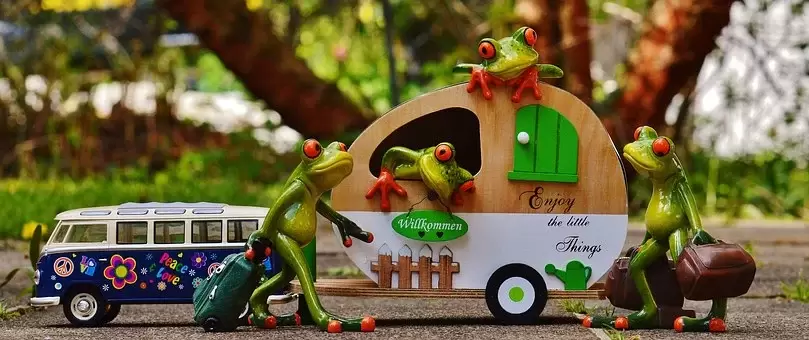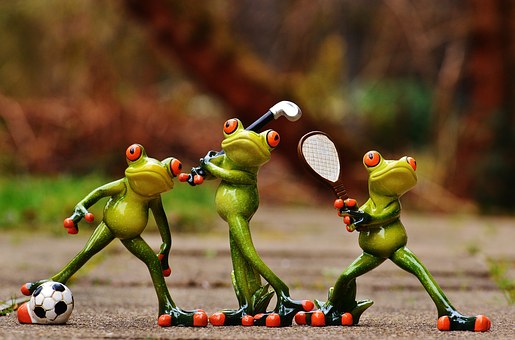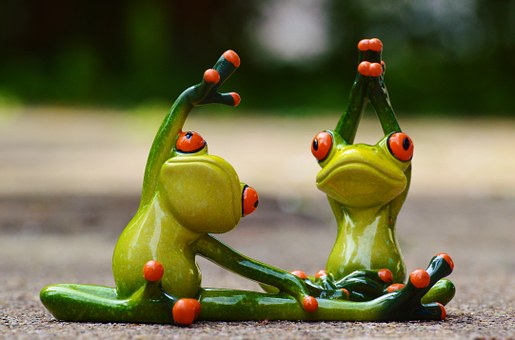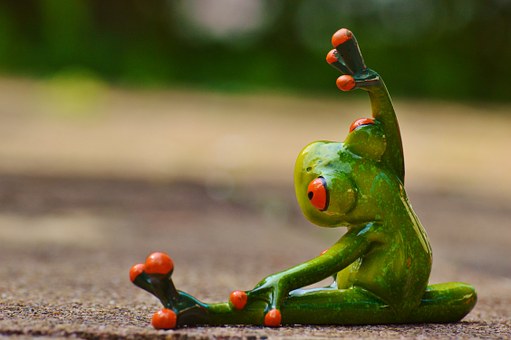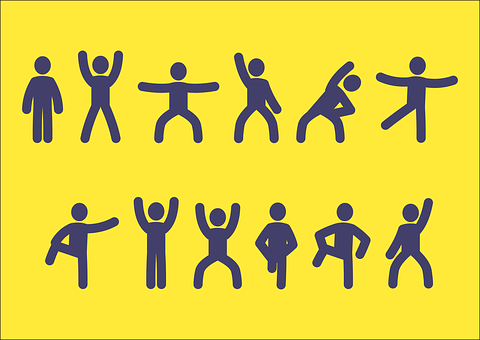Healthy Hobbies
benefits from hobbies
Did you know it is good for your physical and mental health to have a hobby? Sometimes we get so busy with work or our family that we forget to have time for ourselves, which usually allows the stress in our lives to build. Hobbies provide physical and mental health benefits by giving us an alternative place to focus our time and mental energy, reinvigorating us. |
|
A Sense of Accomplishment – If you are having trouble finishing a difficult task at work, you may find satisfaction by completing a project on your own like a quilt, painting, finishing a book, or a 5K.
Social Support System – Often hobbies involve things you can do with others, be it volunteering with Relay for Life or Habitat for Humanity, or joining a just for fun sports league like softball. Preventing Burnout – A hobby may provide fun and something to look forward to after a hard day at work or a stressful time taking care of family members. Improved Physical Health – Studies show that when you engage in enjoyable free time activities you have lower blood pressure and a lower Body Mass Index (or BMI) even if the hobby isn’t necessarily active. Better Work Performance – Studies also have found that employees who have creative hobbies are more satisfied with their jobs and are often more creative with work projects. |
|
Children benefit from hobbies by having a higher self-esteem, learning patience and social skills, and developing critical thinking skills and creativity. Encourage younger children to try several activities as hobbies – think something physical, creative, and mental (geocaching, crafting, music, cooking, or even singing). While some children may consider gaming to be a hobby, encourage them to have other hobbies that don’t use a computer or TV to limit screen time. Hobbies provide both physical and mental health benefits to adults and children. A hidden benefit for adults may be that companies report looking for employees who have hobbies. They feel these employees are more balanced, less stressed, and more creative at work. What hobby is your favorite? United States Library of Medicine, ncbi.nlm.nih.gov/ |
22 Additional Benefits of Having a Hobby or Enjoying a Leisure Activity
Read about the many different ways that having a hobby can improve your life. Without having a hobby, your life may become boring, seem demanding, and end up in an unhealthy cycle. While having a routine is great because it is so easy, incorporating a hobby into your life can add the excitement and spark that it may need to increase your personal satisfaction. This will then flow over to your work performance and ability to maintain a healthy family and other relationships.
Now, let’s learn about the many different ways that having a hobby can improve your life. As you can see, the benefits of having a hobby can greatly improve your life. We recommend taking 15-30 minutes each day and devoting that time to a new passion that has nothing to do with your career or something that you already do at home.
Do some research and find a few things that may pique your interest, then try them out. You don't have to stick with the first thing that you try, but you are bound to find something that interests you for the long term.
Now, let’s learn about the many different ways that having a hobby can improve your life. As you can see, the benefits of having a hobby can greatly improve your life. We recommend taking 15-30 minutes each day and devoting that time to a new passion that has nothing to do with your career or something that you already do at home.
Do some research and find a few things that may pique your interest, then try them out. You don't have to stick with the first thing that you try, but you are bound to find something that interests you for the long term.
|
1. Hobbies are a great stress reliever
Your hobby should be a completely pleasurable activity that allows you to take your mind off of the demands of your daily life, or negative emotions. It’s a healthy and productive distraction from work or personal troubles. While adding an activity to your list of things to do might seem like it could create more stress, I've found that it is actually a great outlet for releasing stress. When you focus on a non-work-related task and you are able to get into the flow of it, all of your stress seems to fade away. For example, maybe you are interested in taking up fishing. While you might initially see this as a time commitment that you cannot really afford, once you are able to carve out the time in your busy schedule to focus on being on the water and in nature, it will help you leave work and life aside for a while. 2. Hobbies encourage you to take a break Hobbies offer you an opportunity to take a break, while also giving you a sense of purpose. If you're like me, you probably like to feel productive no matter what you are doing. If you are engaged in an activity, you don't want to feel like you are just spinning your wheels. A hobby gives you that sense of purpose. You are able to do something while still having fun. Also, the more you do a hobby, the more you are likely to learn about the subject, which will provide you with an increased sense of life satisfaction. Maybe you want to take up a new language or learn to write Chinese characters. The more you engage in your hobby, the more you will learn. 3. Hobbies offer new challenges and experiences Work-related challenges are often accompanied by stress and the pressure to be the best at what you are doing. With a hobby, you can enjoy the process of learning something new without feeling discouraged at being bad at it in the beginning. A hobby can also offer you different types of challenges than you are used to. While you may spend your days at work being challenged mentally, you can take up a hobby that can challenge you physically, such as rock climbing or kayaking. 4. Hobbies allow you to explore yourself and your talents You never really know what you’re capable of unless you try something. You may surprise yourself. For example, you might assume that you would never be one to take up golf because you find it is boring to watch on television, and it seems like a slow way to spend your time. But if you try it, you may discover that you love playing golf, and that you have a certain talent for hitting the golf ball correctly and being successful with the sport. Hobbies help you discover the things that you’re good (and bad) at, and might surprise you. 5. Hobbies can help improve your career While it may seem counterintuitive to make time for something outside of work in order to get ahead at work, career coaches have confirmed that having a hobby can help make you better at your job. Having a hobby helps you learn how to handle work-life stress and think creatively. It also shows employers that you have passions and a drive to do something with your time. A hobby can also help decrease your chances of becoming burned out at work. If your entire routine consists of work and home, with no other stimulation to your brain, you are going to get bored. Having a hobby can help improve your focus and drive while you are at work because it will take away from the time outside of work that you are not engaging your mind. So if you spend time after work focusing on riding your bike, you will give your mind a chance to focus on something specific instead of what happened at work that day. This can help you go back into work the next day refreshed and ready to succeed. 6. Hobbies can provide additional income You may find a hobby that you are good enough at that you can make sales for extra income. You may even get the chance to turn your hobby into a full-time job. For example, maybe you really like to garden, and you spend time keeping your garden well-manicured and healthy. If you find that you really have a knack for that, you may offer garden design services to other people, which could turn into a full-time job. Even if it is just consulting, this would be one example of a great way to make some money off of a hobby. 7. Hobbies help transition you to retirement While the idea of retirement may seem like a great thing, many people find that their lives lose purpose once they stop working. Retirement means a big lifestyle change, and some don’t take it too well. What will you do with all of your free time? Will you feel like your life is fulfilling enough? Having a hobby will allow you to have a life outside of work, so you can have something productive to focus on. For some people, this is as simple as having a bridge group. Many people learn to play bridge in their later years in order to keep an active social life while also still challenging their minds. 8. Hobbies prevent you from wasting time and creating bad habits Hobbies help people avoid boredom. Boredom is actually responsible for a lot of the suffering in our society, and many of people’s destructive behaviors. Having good hobbies to fill up free time makes people less likely to spend their idle time on wasteful or negative activities such as drinking, gambling, or drugs. Hobbies give you something to do when you are unable to find something to fill your time. They also give you something to look forward to. As the old saying goes, “Idle hands are the devil’s workshop.” Hobbies keep you out of trouble, and help relieve boredom. So, rather than sitting around trying to find something to entertain you, you can jump back into your exciting hobby that makes you lose track of time completely. 9. Hobbies help you grow spiritually Just as your body is nourished through food and exercise, your soul needs to be nourished as well. This can happen through creativity and spiritual practice alike. Doing something that leaves you feeling inspired and recharged will help you apply those feelings to other areas of your life. Feeding your soul spiritually involves regularly connecting with your higher power. Your best spiritual hobby will help you feel calm, peaceful, and purposeful. Hobbies are almost a form of meditation because they can help you relax your mind and connect with the higher power. 10. Hobbies help you build self-confidence and improve your self-esteem Pushing your limits and getting out of your comfort zone will help you build your self-esteem as you achieve things you thought were not possible. Each time you progress with your hobby, you are pushing yourself more into a mentality of being able to accomplish anything. You feel good about yourself when you're good at something. Of course, there is a learning curve to any activity, but once you are able to get to the point where you are confident about what you are doing, you will find success in your journey and feel a sense of internal motivation to continue. For example, think of the progress you would make from progressing from an initial taekwondo class to a 10th class. You are destined to make progress in each class, which will lead you to becoming more skilled in the art of tae kwon do. This process will build your self-confidence. 11. Hobbies enrich your perspective Having a new hobby can be very effective when it comes to building character. It enriches your life and provides you with a different perspective on things. Regardless of what type of hobby you take up, you will certainly be exposed to new people and ideas. Having a hobby will help you grow in many ways, including exposing you to diversity, new opinions, and new ways to look at life. |
12. Hobbies improve your memory
You likely already assume that mentally intensive hobbies such as playing chess or learning computer coding can give your brain an excellent workout. However, did you know that craft hobbies like sewing and beading can help improve your memory as well? Doing these purposeful activities has the power to focus your brain, similar to the way meditation does. Crafting hobbies help ward off depression while protecting the brain from memory loss due to aging. 13. Hobbies promote good stress (also known as eustress) Eustress is a positive type of stress that makes you excited about what you're doing. Hobbies are one of the greatest ways to experience this kind of stress. When you're only doing something because you actually want to do it, you feel an excitement that can translate to your life in general. Take playing basketball, for example. If you are just playing for fun, the excitement of the game will probably give you a sense of energy due to the fast gameplay. Your hobby does not have to be as fast-paced as basketball, but it can still give you a challenge that will promote positive stress. 14. Hobbies promote mindfulness and staying present You have probably heard about some of the most talked-about mindfulness techniques, like meditation, but there is an increasing amount of evidence suggesting that many hobbies can also act as effective mindfulness exercises. This is because they encourage people to focus on the task at hand. Doing your hobby trains you to enter a state of flow, especially when you really love and enjoy what you are doing. Take pottery, for example. The concentration that is needed to create a work of art helps center the mind and allows stressful thoughts to go away. Even if you do not have a lot of artistic talent, the process of connecting your mind with your body to create art is enough to bring you to the present moment. 15. Hobbies help ward off depression A lot of people turn to various treatments, therapies, and medications to help control mental illnesses such as depression, but did you know that engaging in hobbies that you already enjoy can help too? One study that tested the potential of knitting to manage anxiety in eating disorders found that patients were able to reduce their feelings of anxiety when they were preoccupied when knitting. Specifically, 74% of participants reported that knitting was both calming and therapeutic. Engaging in a hobby that you already enjoy doing may be the type of effective treatment that you have been looking for. Some common hobbies that people have found to help ward off depression include listening to music, volunteering, keeping a gratitude journal, and playing with pets. Taking time to relax and engage in an enjoyable activity can help benefit your mental health. Hobbies help improve a person’s sense of identity, usefulness, and well-being, and eliminate feelings of worthlessness and self-doubt. 16. Hobbies help keep you physically healthy Engaging in a lifestyle of holistic wellness involves more than just eating healthy foods and exercising. It also includes doing things you love. Studies have shown that engaging in leisure activities not only helps people be happier and less bored, but is also a great way to increase one's productivity and even help people stay in shape. People are more likely to lose weight or stay fit when they take up a physical hobby, which can be both rewarding and fun. On the other hand, forcing yourself to exercise makes it seem like a chore, and often ends in quitting because it is not enjoyable. So, while you may not want to wake up at 5:00 am to run on the treadmill for an hour, you may look forward to joining a kickball team after work, which can provide you with both physical exercise and some social interaction. 17. Hobbies help you sleep better What do you usually do before going to bed? If you're like a lot of people, you probably look through your phone, watch television, or look through social media. And then, you probably have a hard time falling asleep. Instead of wasting your time doing these things, finding a relaxing hobby can slow down your heart rate and decrease the frequency of your brain waves at night. This allows you to fall asleep more easily. Also, feeling the “good” kind of tired after being active during the day can help you get a more restful sleep. So if your hobby is more active, like taking a kickboxing class during the day, this can help exhaust your body and prepare it for a good night's sleep. 18. Hobbies strengthen your relationships Once you find a hobby that you love, you can share it with loved ones, and spend more time together. Maybe your relationship with your spouse has become a bit dull and repetitive, and it is time to add that spark back in. If there is not a new hobby that you both want to start together, invite your spouse to join you in your current hobby. Maybe you have developed a love for cooking. Ask your spouse to join you in the kitchen and see what you all can come up with together. This will help you spend time together while you are cooking, and then even more time afterward while you are enjoying whatever you decided to make. 19. Hobbies allow you to meet new people Mutual tastes in activities such as music, arts, and sports are one of the surest ways to connect with other people. Because of this, it makes sense to take up a hobby if you are looking to meet new people who have similar interests. Hanging about with like-minded people who share your passions can turn out to be an effective way to increase your social circle. Connecting with other people will help you learn new things and improve your skills while also making friends. One great hobby to take up to meet new people is dancing. Try out a salsa class or a different kind of dance that offers classes in your area so you will be able to see and interact with the same people each week. 20. Hobbies help you become more patient To develop a new hobby, you will have to learn how to do something that you may have never done before. There will be a learning curve, and it will require patience to build up your skills. It takes time to become good at something new. Hobbies teach you to be patient with yourself as you learn and grow. Fishing is a great example of a hobby that teaches patience. While there is a learning curve to be good at fishing, there is also a lot of downtime during this sport where you are waiting for fish to bite, or looking for a good place to fish. This requires patience, and will teach it. And you will feel rewarded for your patience once you are successful in catching a fish. 21. Hobbies enable you to give back There are a lot of hobbies that can give you various opportunities to help other people. Here are some examples: Become a mentor Teach a class Donate things that you make Donate your belongings that you do not need anymore Support troops with letter writing and other projects Walk animals at the local shelter Play music for other people Cook at a soup kitchen Volunteer with a search-and-rescue team 22. Hobbies make you more interesting Your hobby may give you a different perspective from others. If you are learning a new language, maybe you will know a lot more about another country than someone else, and they will be interested in your knowledge. Because of your hobby, you may also have some fun stories, experiences, and skills to share with other people. You may even come across someone who wants to take up the hobby that you do, therefore enabling you to become a teacher and talk about everything that you have learned. https://www.developgoodhabits.com |
